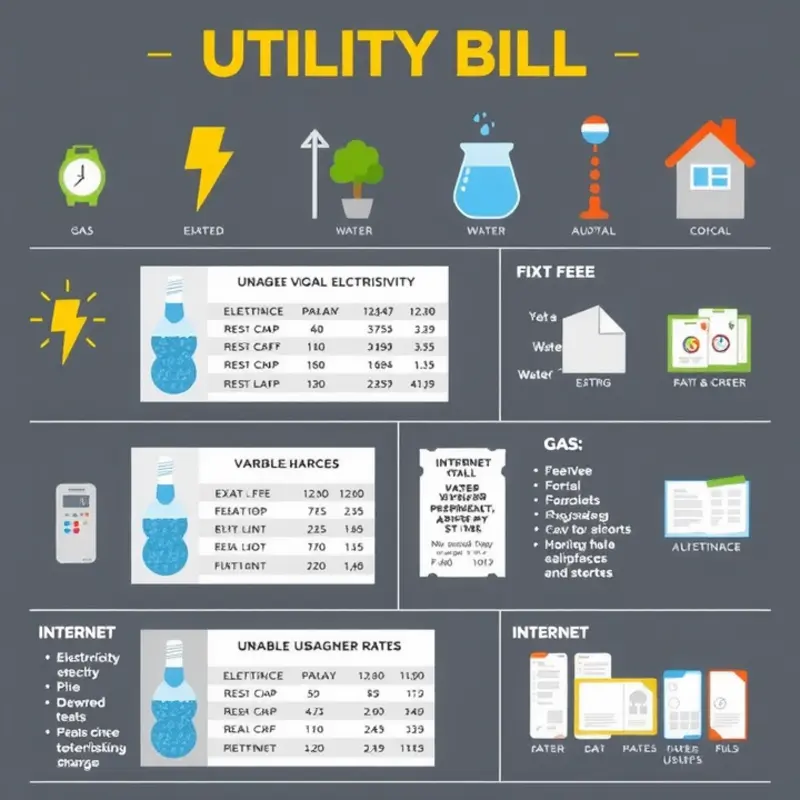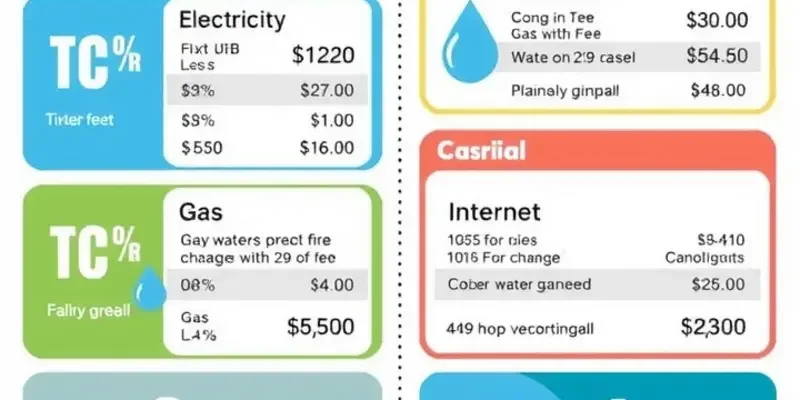Navigating the world of utility charges can be overwhelming, especially for young professionals, first-time renters, students, couples, and families. Utility costs such as electricity, water, gas, and internet can significantly impact your monthly budget, yet they often come as a surprise. Many renters find themselves unprepared for the various charges added to their lease agreements or the fluctuating costs that come after moving in. These expenses may seem trivial at first glance, but gaining insight into utility charges can lead to smarter financial decisions and improved budgeting skills. This guide will break down the essential components of utility charges, helping you identify what to expect, how to budget for these costs, and tips to manage them effectively. Whether moving into your first apartment or settling into a cozy home with your family, understanding utility charges can empower you to take control of your finances and make informed decisions about where you live.
Breaking Down Utility Charges: What You Need to Know

Understanding utility charges is essential for renters aiming to create a realistic budget. These charges can vary significantly based on consumption, provider, and location, impacting your monthly expenses. This chapter unravels the common components of utility costs, including fixed and variable fees, focusing on essential services such as electricity, gas, water, and internet.
Electricity charges are often among the most variable. They depend on your usage, the season, and your provider’s pricing model. Typically, you’ll encounter a base charge, a fixed amount covering infrastructure, and a variable charge based on kilowatt hours (kWh) used. Rates can fluctuate, especially in places with demand charges impacting peak usage times. Understanding these components can help you identify energy-saving opportunities and better manage your electricity bill.
Gas utilities follow a similar structure to electricity. A fixed monthly fee covers service access, while the variable component reflects your usage in therms or gigajoules. Seasonal fluctuations significantly affect gas expenses, with higher costs during colder months due to heating needs. Some providers offer budget billing plans to spread costs evenly throughout the year, providing predictability for financial planning.
Water is typically billed based on consumption, measured in gallons or cubic meters, along with a fixed service fee. The service fee covers maintenance and infrastructure costs, while the variable portion aligns with water usage. Depending on your locality, water conservation efforts or tiered pricing systems might be in place, incentivizing reduced usage.
Internet charges are sometimes less variable as they often involve a flat rate for predetermined service packages. Nonetheless, watch for potential costs like installation fees or data overage charges if your internet plan has limits. Bundling internet with other services might yield cost savings, but it’s crucial to assess whether each component of the bundle suits your needs.
Several factors influence your utility expenses. Your apartment size and the number of occupants play significant roles, impacting consumption of water, electricity, and gas. Additionally, building age and insulation quality can affect heating and cooling efficiency, influencing your energy usage.
Awareness of these factors helps you anticipate changes and control your utility spending more effectively. As a renter, you might find useful tips on monitoring and optimizing energy use on related platforms, aiding in sustainable lifestyle choices.
In conclusion, dissecting the components of your utility charges—fixed fees for access and infrastructure, and variable fees based on use—empowers you to make informed decisions. Recognizing what impacts these costs can enhance your budgeting strategy, ensuring you live both comfortably and within your means. The subsequent chapters will delve into more strategies and resources available for renters to manage their expenses efficiently.
Cost-Saving Strategies for Managing Utility Expenses

Managing utilities effectively starts with understanding how you use energy in your rental space. Begin by assessing your current usage patterns and pinpointing areas of high consumption. Once you have a handle on your usage, consider these practical strategies to cut costs.
Energy Conservation: Energy conservation is key to reducing utility bills. Start by unplugging appliances and chargers when not in use. Utilize power strips to make turning off multiple devices easier. Embrace natural light during daytime hours to save on electricity. Replace old bulbs with energy-efficient LED lights; they consume less power and last longer. In shared spaces, like living rooms and kitchens, make a habit of switching off lights when no one is there. Invest in heavy curtains or thermal blinds to insulate windows, keeping your home warm in winter and cool in summer.
For more in-depth energy-saving tips, check out our recycling tips for renters.
Effective Budgeting Techniques: Creating a budget for utilities involves analyzing your monthly usage. Allocate a specific amount towards utilities based on past bills and leave room for unexpected increases. Employ apps or spreadsheet tools to track your monthly utility expenses against your budgeted amount. If your current bill is higher than expected, identify the culprit and adjust your usage habits. Consider setting up alerts with your utility provider; many offer notifications if you exceed typical usage.
Negotiating and Choosing Utility Providers: Sometimes, landlords may allow tenants to choose their utility providers. If given the option, compare different providers for the best rates. Look for bundled service options that could save you more than separate plans. If your lease permits, explore renewable energy sources that could lower long-term costs.
When sticking with a specific provider, make use of customer service to negotiate better rates. Highlight your loyalty or express interest in competing offers to possibly secure a discount. Always check for any hidden charges or fees associated with your utility plan.
Tailored Strategies for Different Living Situations: Renters, whether individuals, couples, or families, can adopt strategies suited to their circumstances. Individuals might focus on personal mobility and remote work energy-saving tips. Couples can coordinate cooking, laundry, and entertainment times to minimize peak-hour consumption. Families should engage all members in conservation habits, like shorter showers and setting heating/cooling temperatures strategically. Set house rules to build a culture of conservation, ensuring everyone participates in minimizing wasteful habits.
Implementing these strategies requires consistent effort but pays off in the long run. With attention to detail and a proactive approach, controlling and reducing utility expenses becomes achievable for any renter.
Final words
Understanding utility charges is an essential part of managing your finances as a renter in the U.S. With awareness and proactive planning, you can navigate these costs effectively and integrate them into your overall budget. By breaking down the types of charges you might face, alongside practical strategies to reduce costs, you are empowered to make informed decisions, ensuring that your living situation is both comfortable and sustainable. Take control of your utility expenses and start building financial clarity for a more secure future.









